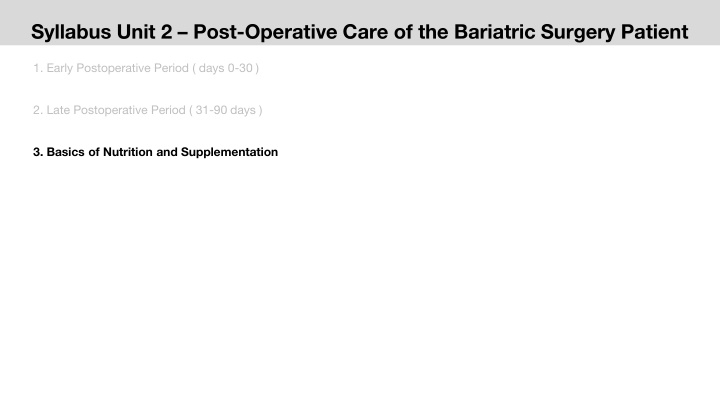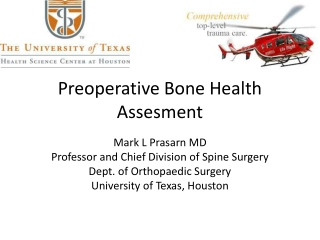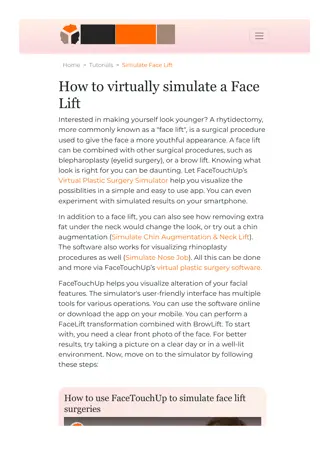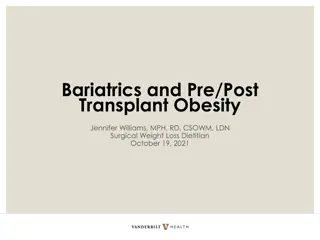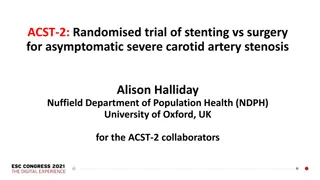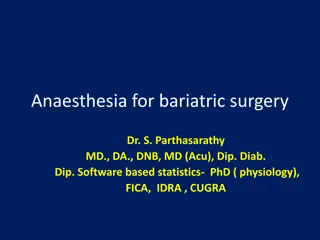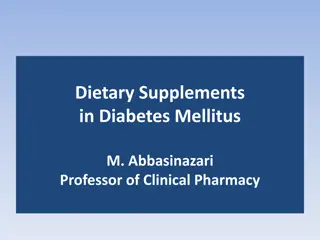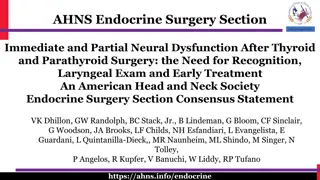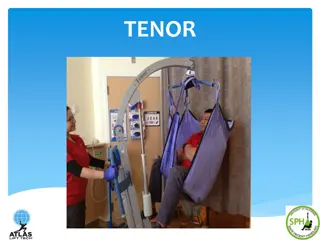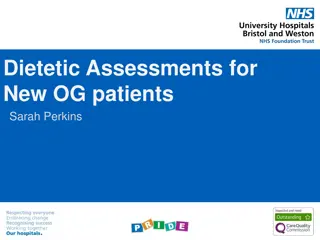Long-Term Dietary Management for Bariatric Surgery Patients
In the post-operative care of bariatric surgery patients, long-term dietary management plays a crucial role in ensuring successful weight loss maintenance. Factors such as motivation, willingness, and adherence to a healthy diet influence eating habits. Patients are advised on dietary progression, starting from a liquid diet to blended/pureed foods and then normal textured foods. Emphasizing the importance of meal preparation, meal regularity, portion control, and continued support from health professionals is key to sustained success.
Download Presentation

Please find below an Image/Link to download the presentation.
The content on the website is provided AS IS for your information and personal use only. It may not be sold, licensed, or shared on other websites without obtaining consent from the author.If you encounter any issues during the download, it is possible that the publisher has removed the file from their server.
You are allowed to download the files provided on this website for personal or commercial use, subject to the condition that they are used lawfully. All files are the property of their respective owners.
The content on the website is provided AS IS for your information and personal use only. It may not be sold, licensed, or shared on other websites without obtaining consent from the author.
E N D
Presentation Transcript
Syllabus Unit 2 Post-Operative Care of the Bariatric Surgery Patient 1. Early Postoperative Period ( days 0-30 ) 2. Late Postoperative Period ( 31-90 days ) 3. Basics of Nutrition and Supplementation
Basics of Nutrition: Long-Term Diet Dietary influenced environment, culture, psychosocial factors and finances and nutritional a intake and factors eating behaviours including are by number of genetics,
Basics of Nutrition: Long-Term Diet Long-term diet eating habits are in part determined by the patient s motivation, willingness, and ability to adhere to a healthy diet. As weight loss plateaus and the need for external calories increases, sensation of hunger returns.
Basics of Nutrition: Long-Term Diet Long-term diet eating habits are in part determined by the patient s motivation, willingness, and ability to adhere to a healthy diet. As weight loss plateaus and the need for external calories increases, sensation of hunger returns. Research suggests that the following behaviours help with weight maintenance; eating breakfast, lunch and dinner regularly, not grazing or snacking, stopping eating when feeling full, getting weighed regularly and being active.
Basics of Nutrition: Long-Term Diet Long-term diet eating habits are in part determined by the patient s motivation, willingness, and ability to adhere to a healthy diet. As weight loss plateaus and the need for external calories increases, sensation of hunger returns. Patients will need to understand how to choose healthy foods and avoid skipping meals. Preparing meals and snacks on a daily basis is part of the new skills and goals all patients must learn. For maintain the diet, exercise and daily routines. successful weight loss maintenance, patients must Access to continued support from dietetic and behavioural health professionals.
Dietary Progression Patients are advised to progress from a liquid diet to a blended/pureed diet and then towards more normal textured food. Eating slowly and chewing food well are encouraged otherwise food may become lodged in the gastric pouch, leading to abdominal discomfort, vomiting or regurgitation. This can be stressful for the patient and may lead to food intolerances or food aversions. The dietitian should liaise with the surgeon as it is important to exclude an anastomotic stricture or an overtight band being the cause. If the patient is unable to tolerate oral diet and vomiting, they may be at risk of developing thiamine deficiency and thiamine should be given. If a surgical cause is excluded, the dietitian and patient should work together to ensure appropriate foods, textures and cooking methods.
Supplementation Patients will need multivitamin and mineral supplements lifelong to prevent deficiencies. Micronutrient deficiencies can occur in patients with obesity. Pre-surgical and postoperative screenings are important to reduce its incidence. Fat-soluble vitamins, including vitamins A, E, K, and D, can present deficiencies as the jejunum and ileum are the primary sites for absorption. If there is a deficiency, it must be stabilized by supplemental intake. These deficiencies are not common prior to surgery, however, the incidence will increase with hypoabsorptive procedures such as OAGB, BPD/DS, and SADIs. Therefore, it is appropriate hypoabsorptive procedures and appropriate supplementation after surgery. to screen that for these receive before ensure patients the Thiamin (B1): B1 deficiency must be prevented because it can result in neurological deficits. It can appear in patients presenting with persistent vomiting or severely diminished oral intake. immediately give thiamine. in addition it is mandatory to give thiamine before fluids and glucose If deficiency is suspected,
Supplementation Vitamin B12 deficiency, which results in pernicious (megaloblastic) anemia, is permanent, and should be treated with oral or parenteral supplements. B12 deficiency increases after surgery and if left untreated, it can cause degeneration of the spinal cord. Folate deficiency, which also induces megaloblastic anemia, is less common than vitamin B12 deficiency as folic acid is absorbed throughout the entire small intestine. It can be a sign that the patient is not taking their postoperative vitamins. Iron deficiency must be carefully controlled, as it can cause anemia. A routine supplementation is needed. Other deficiencies: Vitamin C, Zinc, Copper, Selenium and Calcium are deficiencies that can appear and must also be corrected. Calcium and vitamin D deficiency is a risk factor for bone fractures. All patients should be instructed on requiring high-dose multivitamin supplementation. Some procedures have a higher risk of deficiencies than others.
References 1. Kopelman P, Jebb SA, Butland B. Executive summary: Foresight 'Tackling Obesities: Future Choices' project. Obes Rev. 2007 Mar;8 Suppl 1:vi-ix. doi: 10.1111/j.1467-789X.2007.00344.x. PMID: 17316292. 2. Brown J, Clarke C, Johnson Stoklossa C, Sievenpiper J. Canadian Adult Obesity Clinical Practice Guidelines: Medical Nutrition Therapy in Obesity Management. 3. Allied Health Sciences Section Ad Hoc Nutrition Committee, Aills L, Blankenship J, Buffington C, Furtado M, Parrott J. ASMBS Allied Health Nutritional Guidelines for the Surgical Weight Loss Patient. Surg Obes Relat Dis. 2008 Sep-Oct;4(5 Suppl):S73-108. doi: 10.1016/j.soard.2008.03.002. 4. Parrott JM, Craggs-Dino L, Faria SL, O'Kane M. The Optimal Nutritional Programme for Bariatric and Metabolic Surgery. Curr Obes Rep. 2020 Sep;9(3):326-338. doi: 10.1007/s13679-020-00384-z. 5. Sarwer DB, Dilks RJ, West-Smith L. Dietary intake and eating behavior after bariatric surgery: threats to weight loss maintenance and strategies for success. Surg 10.1016/j.soard.2011.06.016. Obes Relat Dis. 2011 Sep-Oct;7(5):644-51. doi: 6. Mitchell JE, Christian NJ, Flum DR, Pomp A, Pories WJ, Wolfe BM, Courcoulas AP, Belle SH. Postoperative Behavioral Variables and Weight Change 3 Years After Bariatric Surgery. JAMA Surg. 2016 Aug 1;151(8):752-7. doi: 10.1001/jamasurg.2016.0395.
References 1. Shawe J, Ceulemans D, Akhter Z, Neff K, Hart K, Heslehurst N, totl I, Agrawal S, Steegers-Theunissen R, Taheri S, Greenslade B, Rankin J, Huda B, Douek I, Galjaard S, Blumenfeld O, Robinson A, Whyte M, Mathews E, Devlieger R. Pregnancy after bariatric surgery: Consensus recommendations for periconception, antenatal and postnatal care. Obes Rev. 2019 Nov;20(11):1507-1522. doi: 10.1111/obr.12927. Epub 2019 Aug 16. PMID: 31419378; PMCID: PMC6852078. 2. Parrott J, Frank L, Rabena R, Craggs-Dino L, Isom KA, Greiman L. American Society for Metabolic and Bariatric Surgery Integrated Health Nutritional Guidelines for the Surgical Weight Loss Patient 2016 Update: Micronutrients. Surg Obes Relat Dis. 2017 May;13(5):727-741. doi: 10.1016/j.soard.2016.12.018. Epub 2017 Jan 19. PMID: 28392254. 3. O'Kane M, Parretti HM, Pinkney J, Welbourn R, Hughes CA, Mok J, Walker N, Thomas D, Devin J, Coulman KD, Pinnock G, Batterham RL, Mahawar KK, Sharma M, Blakemore AI, McMillan I, Barth JH. British Obesity and Metabolic Surgery Society Guidelines on perioperative and postoperative biochemical monitoring and micronutrient replacement for patients undergoing Nov;21(11):e13087. doi: 10.1111/obr.13087. Epub 2020 Aug 2 bariatric surgery-2020 update. Obes Rev. 2020
